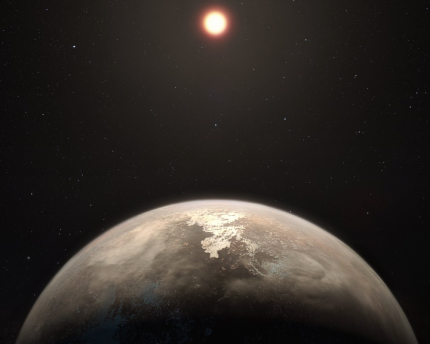
Artist's concept of the exoplanet Ross 128b and its star.
Image: European Southern Observatory, M. Kornmesser.
A year ago, scientists announced that they had found a planet of about the same size orbiting in the habitable zone of its star. The planet, just 11 light-years from our solar system, is thought to have a temperate climate and could sustain life. But a new study of the planet concludes that while there are similarities the planet is not a “twin.”
This week, scientists reported detailed conclusions about the chemical abundances of the planet’s host star, Ross 128. Understanding a star’s elements helps researchers estimate the makeup of planets in orbit around it, according to the Carnegie Institute for Science. This is because young stars are initially surrounded by rotating gas and dust from which planets form.
Ross 128 is a red dwarf star, like 70 percent of all stars in the Milky Way. These stars, while abundant, are cooler and smaller than our sun. As part of the new study, scientists measured the star’s near-infrared light to ascertain the presence of carbon, oxygen, magnesium, aluminum, potassium, calcium, titanium and iron.
The team found that the star's iron levels are similar to the sun. But they also found that the ratio of iron to magnesium in the star indicates that the core of the planet Ross 128 b should be larger than Earth’s, according to the institute.
Previously, scientists had deduced that the planet probably had a temperate climate. This team also measured the temperature of the star, along with the radius of the planet, to determine the amount of light reflecting off the surface of the planet. Using this information, they reaffirmed that the planet likely has a temperate climate and could have liquid water on the surface.
The study is "Stellar and Planetary Characterization of the Ross 128 Exoplanetary System from APOGEE Spectra," by Diogo Souto of Brazil’s Observatório Nacional, et al., published in the Astrophysical Journal Letters.
Related:
Planet has 'temperate' climate
Proxima b may not be in habitable zone
Small probe could orbit Proxima b
If you would like to comment, like us on Facebook and tell us what you think.